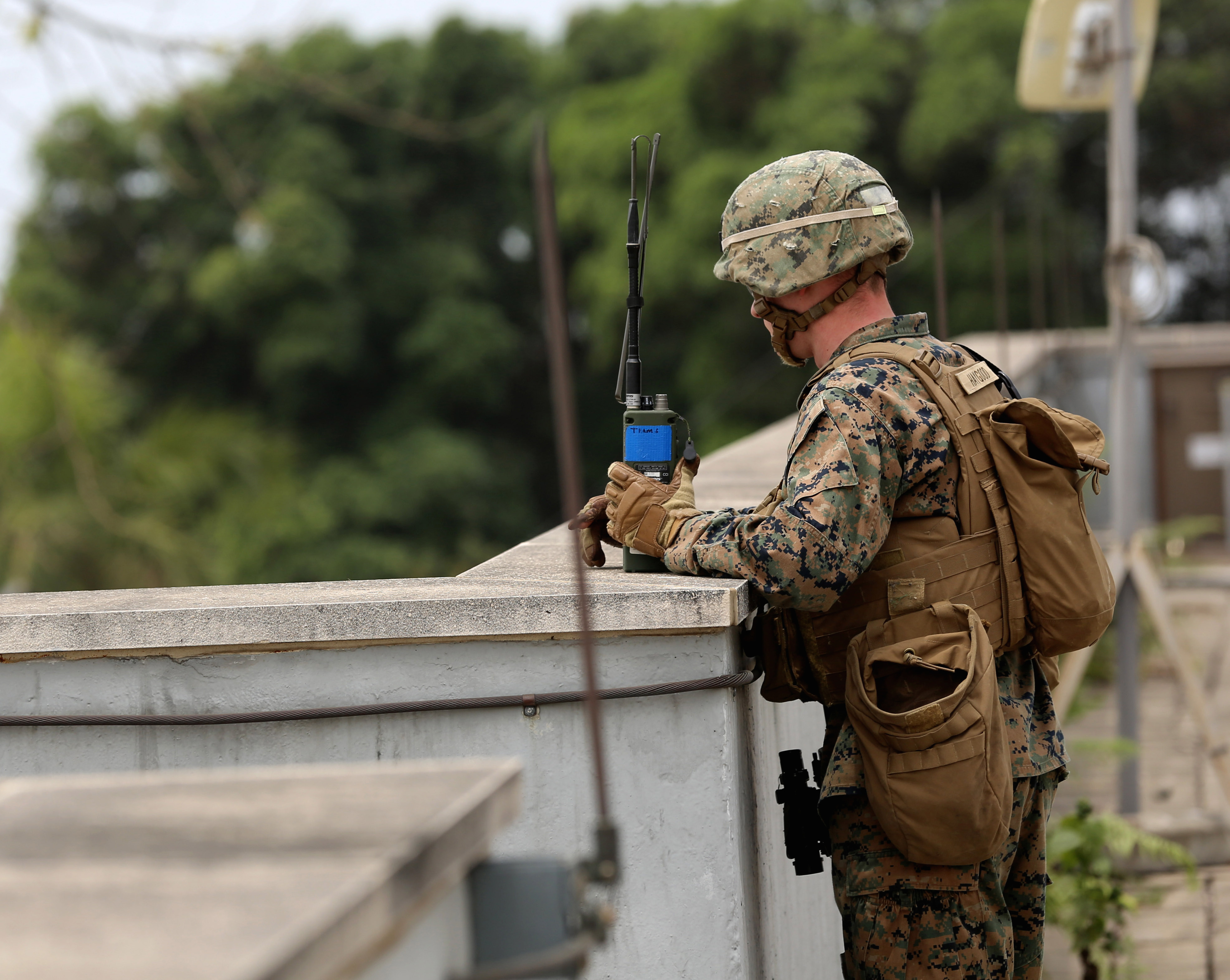
The murder of Ambassador J. Christopher Stevens and three Americans in his security detail during an attack on the American consulate in Benghazi, Libya, on Sept. 11, 2012 has created a new normal for the Marine Corps and new means to operate in the Middle East and Africa, the senior Marine at Central Command said on Wednesday.
Speaking at the Navy League’s Sea Air Space exhibition 2014 at National Harbor, Md., Lt. Gen. Robert Neller added, “There are opportunities . . . to support our partners, train with them” in a host of missions. The Marine Corps adapted its Marine Expeditionary Units (MEUs) to the changed dynamics arising from the “Arab Spring” and created organizations such as the Marine Special Purpose Marine Air-Ground Task Force Crisis Response to meet the new demands of being ready for what might happen at an embassy or even a food depot or to nongovernmental organization employees and training African security forces coping with the franchising of al Qaeda.
The killings changed African Command, said Maj. Gen. Raymond Fox, deputy commander of Marines in Central Command. “There was not a lot of American military involvement on the continent before and it “certainly changed when al Qaeda . . . picked up its weapons and went to Libya and the Maghreb” after the Arab Spring.
“We have to get used to operating in Africa. They have to get used to us.” And that acquaintance has to happen before an Osprey carrying Marines lands during a crisis. Africans “are a little suspicious” of why the United States is showing its presence, but “that’s normal,” Fox said.
One of the first lessons, Fox said Marines and Americans need to understand, is how large Africa is—3.7 times the size of the United States. “That’s a long way to get to a crisis,” Col. Scott Benedict, who commanded a Special Purpose MAGTF Crisis Response unit, even when operating from Signonella, Italy, or Moron, Spain.
In addition to the tyranny of distance and time that mark operations in the Pacific, getting to places on the continent require overflight permission from each nation whose territory is to be crossed, Neller added.
If permission is denied by one country, the distance becomes longer as an alternative route has to be arranged, taking a toll on the Marines being carried in a V-22 Osprey, Benedict said. “The V-22 is not a transporter.”
To help in that area, “nothing happens fast,” but “we’re moving in a positive direction” with Senegal in operating from that country, Neller said.
Operations such as these or small unit training missions also raise questions about sustained logistics or how is a medical emergency handled that requires more than field care.
“We’ve gotten spoiled,” Neller said, noting the strong sustainment support and medical care available for Afghanistan and Iraq. “This stuff is going to get harder,” referring to logistics and medical sustainment.
Col. Matthew St. Clair said while commanding the 26th Marine Expeditionary Unit 4 on its recent eight- month deployment he was ready to respond within six hours to an order in a developing crisis. “That’s pretty impressive.”
“We performed four theater security operations, three in CENTCOM” and one disaggregated operation with European Command for a possible contingency mission in Lebanon. He said the MEU remained on “heightened alert for 9/11,” but was usually on alert for at least an hour a day throughout the deployment. For example, the MEU spent “30 days in the Red Sea [off Egypt] prepared to protect the embassy [in Cairo] and evacuate Americans” and also spent more than two weeks preparing to do the same in Yemen.
“The primary customer seems to be the State Department,” he said.
He added that when operating off Djibouti, the MEU was in a position to support requests from European Command, as well as CENTCOM and AFRICOM.
Noting the special purpose task forces didn’t exist a year ago, Benedict said, “I think we forget how powerful” they are. The task forces can be as small as a Marine company, half a squadron of Ospreys and C-130J refuelers, a logistical element and a command element. “They are tailored for special tasks.”
The Marine Security Force Regiment has a longer history, pre-dating Operations Desert Shield/Desert Storm. It is forward-deployed in Spain, Bahrain, and Japan, its commander, Col. James Bright said. Its Fleet Anti-Terrorism Security Teams have been around since 1987 and deployed more than 70 times on security missions. “FAST is an anti-terrorism capability [including chemical, biological, radiological and nuclear training and equipment] completely different from counterterrorism capability. We deter, we detect, we defend.”
Fox stressed the need for coordination in Africa and Central Command inside the Marine Corps and also with Army Special Forces already present in a number of those countries and National Guard soldiers carrying out partnership programs in the same regions. “They’re already on the ground.”
When asked whether the Marine Corps was readying a crisis response force for the Middle East, Heller said, “We’re looking at that, [but] it’s premature for me to talk about that.”





